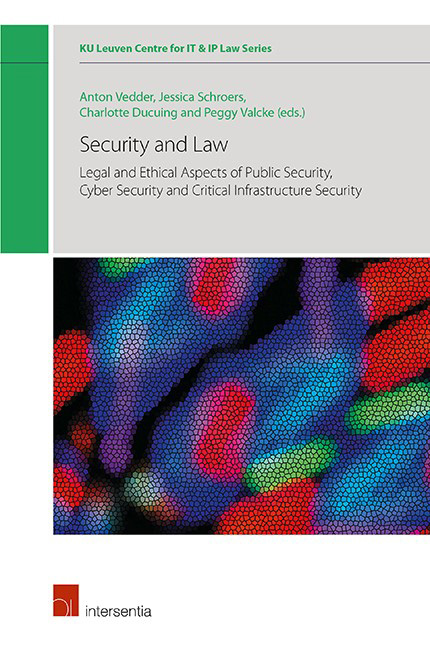 Security and Law
Security and Law Book contents
- Frontmatter
- Contents
- List of Contributors
- Chapter 1 Introduction: Security and Law in a Digitizing World
- Chapter 2 Safety, Security and Ethics
- Chapter 3 National and Public Security within and beyond the Police Directive
- Chapter 4 Criminal Profiling and Non-Discrimination: On Firm Grounds for the Digital Era?
- Chapter 5 Operationalization of Information Security through Compliance with Directive 2016/680 in Law Enforcement Technology and Practice
- Chapter 6 Protecting Human Rights through a Global Encryption Provision
- Chapter 7 Identity Management and Security
- Chapter 8 Towards an Obligation to Secure Connected and Automated Vehicles “by Design”?
- Chapter 9 The Cybersecurity Requirements for Operators of Essential Services under the NIS Directive – An Analysis of Potential Liability Issues from an EU, German and UK Perspective
- Chapter 10 The ‘by Design’ Turn in EU Cybersecurity Law: Emergence, Challenges and Ways Forward
- Chapter 11 Promoting Coherence in the EU Cybersecurity Strategy
- Chapter 12 Challenges of the Cyber Sanctions Regime under the Common Foreign and Security Policy (CFSP)
- Chapter 13 International (Cyber)security of the Global Aviation Critical Infrastructure as a Community Interest
- Cumulative Bibliography
- Miscellaneous Endmatter
Chapter 2 - Safety, Security and Ethics
Published online by Cambridge University Press: 23 January 2020
- Frontmatter
- Contents
- List of Contributors
- Chapter 1 Introduction: Security and Law in a Digitizing World
- Chapter 2 Safety, Security and Ethics
- Chapter 3 National and Public Security within and beyond the Police Directive
- Chapter 4 Criminal Profiling and Non-Discrimination: On Firm Grounds for the Digital Era?
- Chapter 5 Operationalization of Information Security through Compliance with Directive 2016/680 in Law Enforcement Technology and Practice
- Chapter 6 Protecting Human Rights through a Global Encryption Provision
- Chapter 7 Identity Management and Security
- Chapter 8 Towards an Obligation to Secure Connected and Automated Vehicles “by Design”?
- Chapter 9 The Cybersecurity Requirements for Operators of Essential Services under the NIS Directive – An Analysis of Potential Liability Issues from an EU, German and UK Perspective
- Chapter 10 The ‘by Design’ Turn in EU Cybersecurity Law: Emergence, Challenges and Ways Forward
- Chapter 11 Promoting Coherence in the EU Cybersecurity Strategy
- Chapter 12 Challenges of the Cyber Sanctions Regime under the Common Foreign and Security Policy (CFSP)
- Chapter 13 International (Cyber)security of the Global Aviation Critical Infrastructure as a Community Interest
- Cumulative Bibliography
- Miscellaneous Endmatter
Summary
INTRODUCTION
What are safety and security? Why should we value safety and security? These questions may sound redundant at first sight. Are safety and security not to be considered as elementary conditions for a minimally functioning human being? Exactly because of this apparent self-evidence, policy and law makers, as well as researchers of the legal dimensions or technical or economic aspects of safety and security might benefit from a more precise understanding of the concepts and the normative starting points behind them. This is especially so where specific measures or policies for ensuring or protecting safety and security must be balanced against other values or principles. In this chapter, the notions of security and safety will be clarified as normative concepts from an analytical ethical perspective. In the next section, current discussions on the definitions and conceptual distinctions with regards to the notion of security and the related notion of safety will be discussed. In section 3, the focus will be on security and safety as values. In section 4, the possibility of moral conflicts between safety and security on the one hand and individual rights and interests on the other, will be discussed.
DEFINITIONS AND DISTINCTIONS
Although the notions of safety and security have received an occasional modest dose of attention during the last decades from the side of philosophers in some subdomains of applied ethics, such as technology ethics and medical ethics, they have been most intensively debated in philosophy of law and in a branch of practical philosophy, perhaps best referred to as normative political theory. So-called “realist” or “neo-realist” political theorists – from Thucydides, over Machiavelli, Hobbes, Morgenthau to Waltz – start from the assumption that as individual human beings are fundamentally selfish and driven by a lust for power, only (voluntary) subjection to a sovereign state that is able to provide protection can offer security and safety for one individual from intrusions by others or for one state from others. In the controversies among realists themselves and in the debates between realists and their opponents, the notions of safety and security have therefore been articulated primarily on deep theoretical levels as global value-laden characteristics of individuals and of societies or states overall.
- Type
- Chapter
- Information
- Security and LawLegal and Ethical Aspects of Public Security, Cyber Security and Critical Infrastructure Security, pp. 11 - 26Publisher: IntersentiaPrint publication year: 2019
- 4
- Cited by


